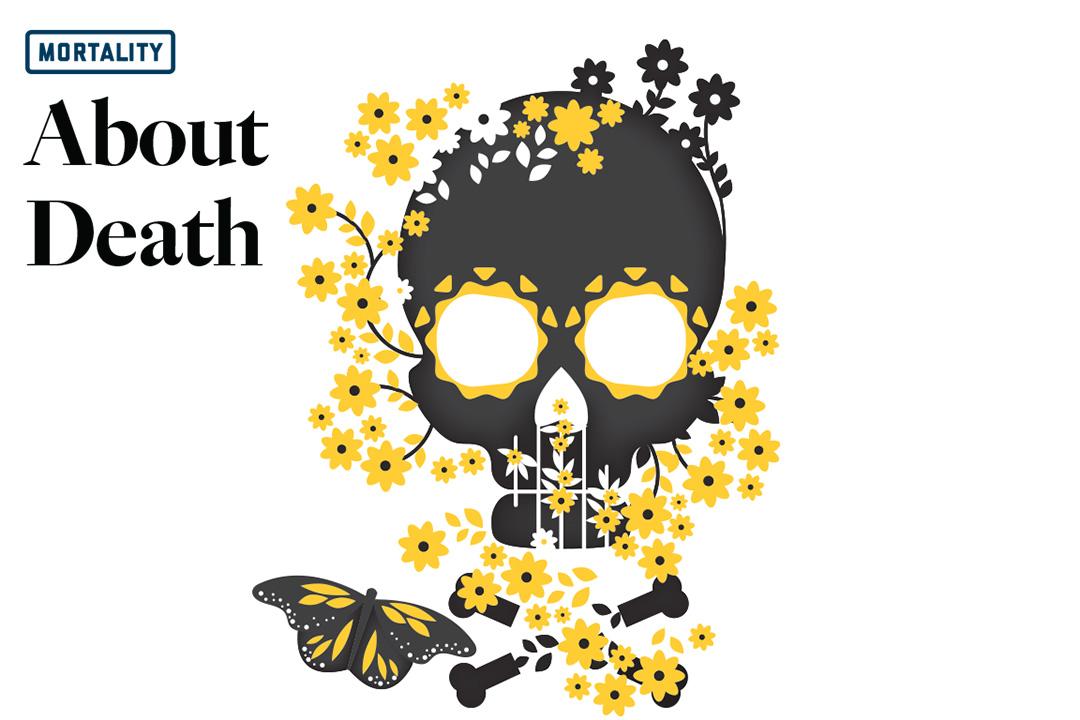Institutional Knowledge: About Death
(Illustration: Francelyn Fernandez)
Retiring professor Pamela Woodruff addresses the inevitability that’s not taxes
By Matthew Stoss
Oblivion makes Pamela Woodruff, BA ’76, MPhil ’92, uncomfortable. It’s may be the only thing that unnerves the just-retired GW psychology professor about death, a subject she taught for 36 years in a popular class, “Attitudes Toward Death and Dying.”
“I want to have the hope that there is something more,” Ms. Woodruff says of an afterlife. “I don’t believe in it absolutely. I simply hope that it’s there.”
A month after the 74-year-old Ms. Woodruff called it a career in May, she talked with GW Magazine about mortality, mankind and how she wants to die.
“I would like to know it’s about to happen.”
Brave.
“Well, I say this now. I don’t think so, but of course, at the moment, you could panic.”
But if there’s nothing on the other side of the darkness, she’ll adjust.
“I don’t want to, but we’re not gonna have a choice, are we?”
Ms. Woodruff, at age 22, became interested in death and how we die while at the National Institutes of Health. For 12 years, she worked with cancer patients, many terminal, who were participating in clinical trials.
“I was seeing how many young adults near my age died and people would say—because there was a whole ward of children with cancer—‘Doesn’t it bother you about the little children?’ And I’d say, ‘No, not really.’ I’d never had a child. I couldn’t go through the emotions that parents went through. I identified with those in their 20s, early 30s who were dying. I was immersed in death from Day One.”
“WE SAY, ‘I LOST MY MOTHER.’ IS SHE WANDERING THE AISLES OF BLOOMINGDALES? YOU HAVEN’T LOST HER. SHE’S DEAD.”
She says many of her NIH colleagues at the time had trouble speaking plainly about not only death but anything taboo. It bothered her. It still bothers her.
“I wanted to be out there being a converter, not to a religion but to being more accepting about death and talking about it directly.”
There is a George Carlin bit about “soft language.” Ms. Woodruff does similar material, lamenting humanity’s euphemism dependency. She wants people to say what they mean because she believes that brand of ultimate honesty makes us more open and sensitive and less inured, less afraid. She wants people to be stronger, to confront what’s hard, what’s hardest, because it will make us better.
“We say, ‘I lost my mother.’ Is she wandering the aisles of Bloomingdales? You haven’t lost her. She’s dead.”
Ms. Woodruff, who plans to spend her retirement volunteering at a hospice, is blunt. She speaks freely about dying and death in all its forms—suicide, euthanasia, abortion, public execution, murder.
“I like—more than like—shocking people. I guess they don’t expect it coming out of a short, morbidly obese old lady. … I look very docile.”
There’s more to it than shock value. That’s just her being (endearingly) contrarian. She insists that she doesn’t have wisdom to give, preferring a professorial approach predicated on asking questions rather than answering them because death, after all, is a personal experience. So she asks things like, “Who are you? Are you your physical body or are you your thoughts?”
Ms. Woodruff makes you think about death in a way that’s comfortably uncomfortable, in a way that’s new—a way that’s even fun—but reminding you always that dying comes before death.


